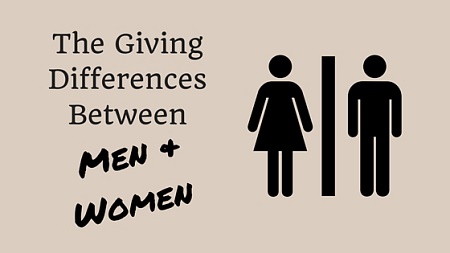The differences between men and women are plentiful, from how they work out problems to how they communicate. And now, new research shows that how they give to charity is also different.

“Women and men both bring their own preferences, priorities and financial resources to a household, and they both influence the couple’s charitable giving, but they affect it differently,” said Una Osili, Ph.D., director of research for the school. “For example, differences in men’s and women’s income shape not only the couple’s overall giving but also what causes they support.”
Amir Pasic, Ph.D., Eugene R. Tempel Dean of the school said that prior research focused solely on couples as a single unit versus individuals. “By delving more deeply into the factors that influence charitable giving by couples, this study provides a more thorough understanding of gender differences in giving”, he went on to say.
Key Findings
- 45% of all donors surveyed give to causes that specifically support women and girls. Half of women donors and 2 out of 5 men give to these causes.
- In high net worth households ($250,000+ in income and/or $1 million+ in assets, excluding their main residence), men and women share the same motivations for giving – gender differences appear in lower priority motivations.
- Women are more likely to say they give because of political/philosophical beliefs, because they are on a board/volunteer for an organization, or spontaneously in response to need, than men.
Additional nonprofit giving statistics from Where Do Men and Women Give? and Do Women Give More? are below:
Men vs. Women Nonprofit Giving By Charitable Subsector
- Single women are more likely to give than single men.
- Both single women with high net worth and single men with high net worth are more likely to give. However women are more inclined to give to the arts and environment, whereas men are more inclined to give to combination organizations, like United Way.
- Single women spread their giving out more than men. High net worth single women and high net worth single men are similar in the concentration of their giving.
Men vs. Women Nonprofit Giving by Society Issues
- For both general and high net worth, single women are more likely to support women’s rights than single men, and are also less likely to support the economy and veterans’ issues than single men.
- When the husband decides how to give, the household is more likely to donate to the arts as a social issue. When the wife decides how to give, the household is more likely to donate to animal welfare.
- For high net worth households where the husband decides how to give, the household is more likely to support economy issues, and less likely to support poverty than if the deciding jointly. For high net worth households where the wife decides how to give, the household is more likely to support human rights organizations.
Men vs. Women Nonprofit Giving by Motivation
- In households where the wife decides where to give, the couple is more likely to respond to spontaneous needs, believing that their gift will make a difference due to their religious and/or philosophical beliefs; however they are less likely to be motivated by religious beliefs than couples deciding jointly.
- In households where the husband decides where to give, the couple is less likely to respond to setting an example for future generations, religious beliefs, and personal satisfaction, than couples deciding jointly.
- Million dollar donors: individual women mention “scholarship” and “student” more than men – focusing on the people they are affecting.
“The new research will help fundraisers better understand donors’ interests, what motivates them to give, and which donors support what causes,” said Debra Mesch, Ph.D., director of the Women’s Philanthropy Institute and Eileen Lamb O’Gara Chair in Women’s Philanthropy at the Lilly Family School of Philanthropy. “Our study also will provide donors with a deeper understanding about how income and other factors affect households’ giving across charitable causes.”
To learn more about The Women’s Philanthropy Institute’s study, visit https://philanthropy.iupui.edu/news-events/news-item.html?id=174.
—
Capital Business Solutions is an integrated financial software solutions company, helping churches, local governments, and nonprofit organizations streamline and simplify their fund accounting processes.